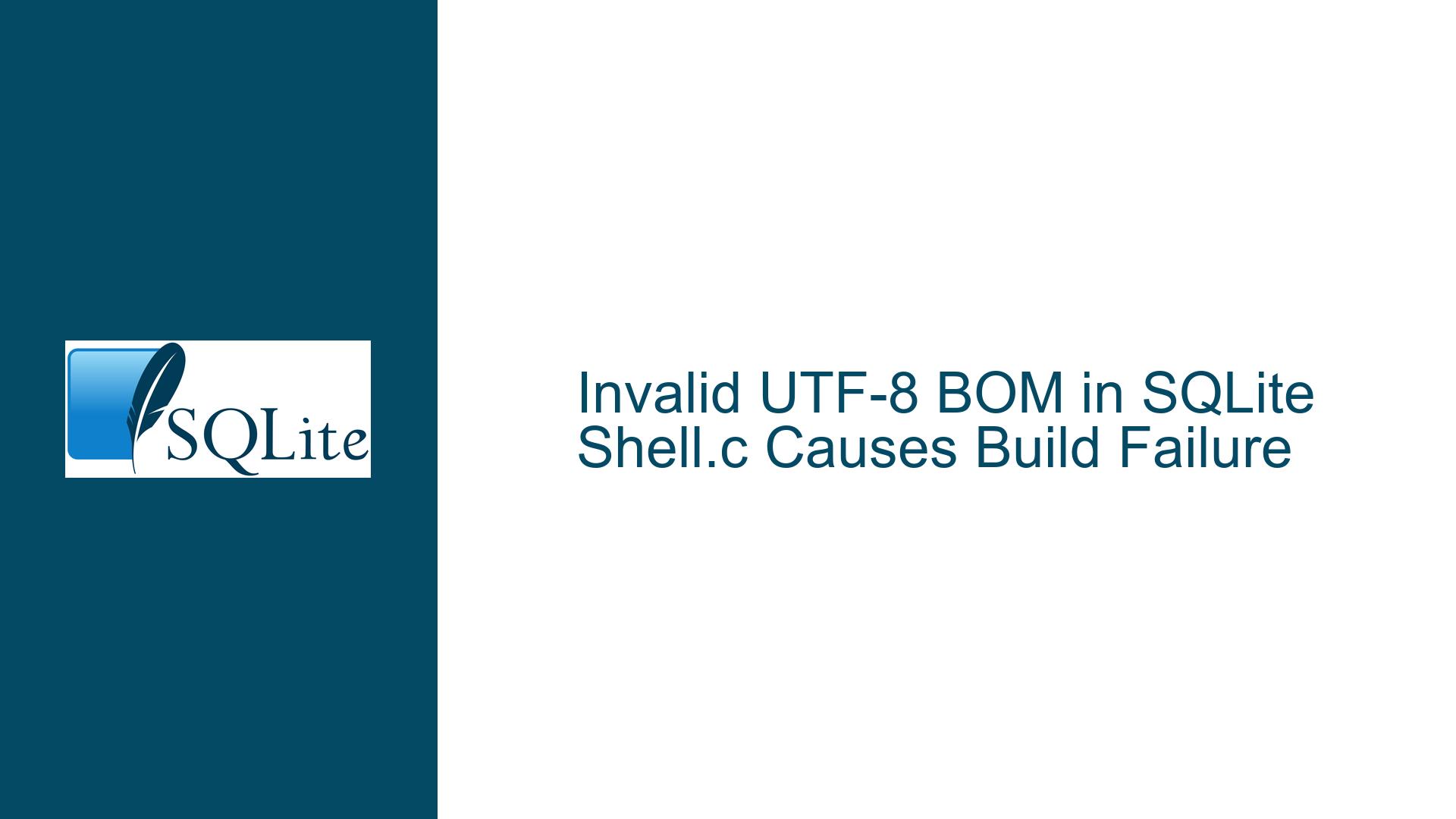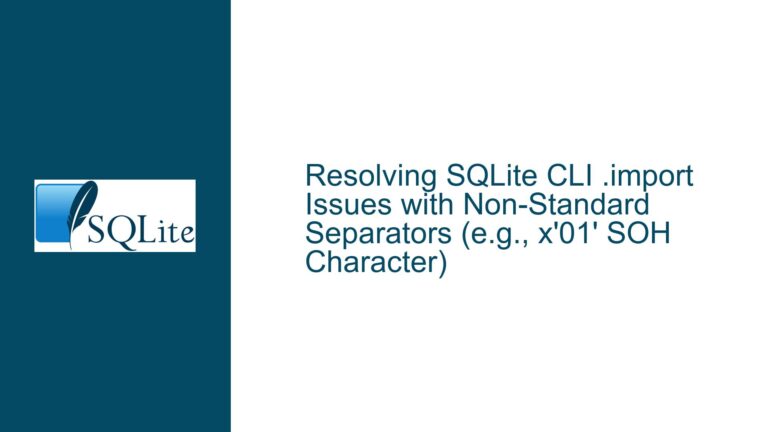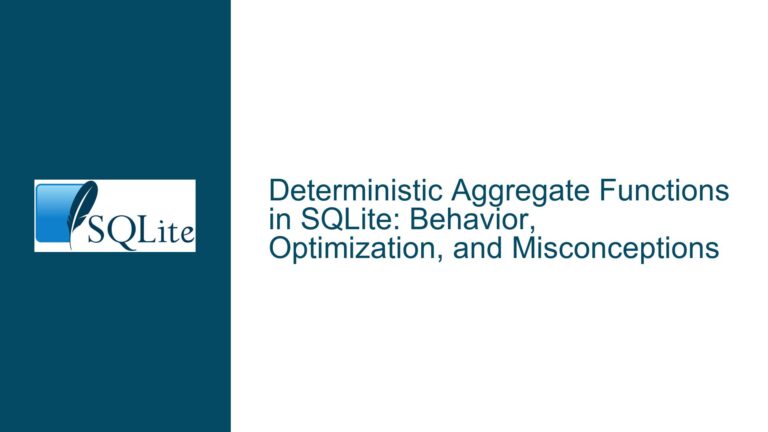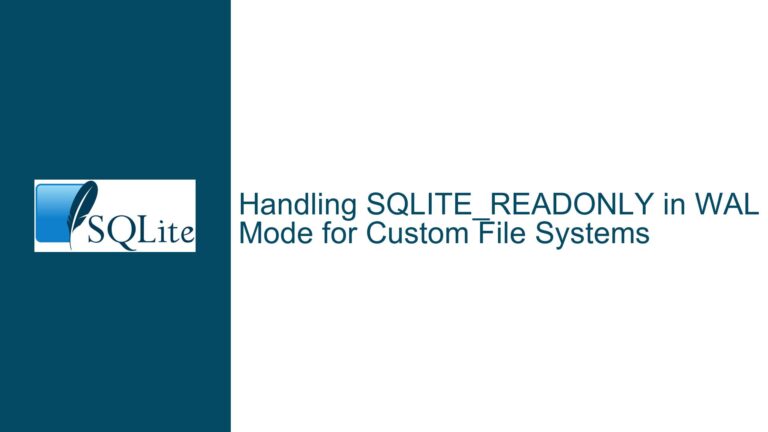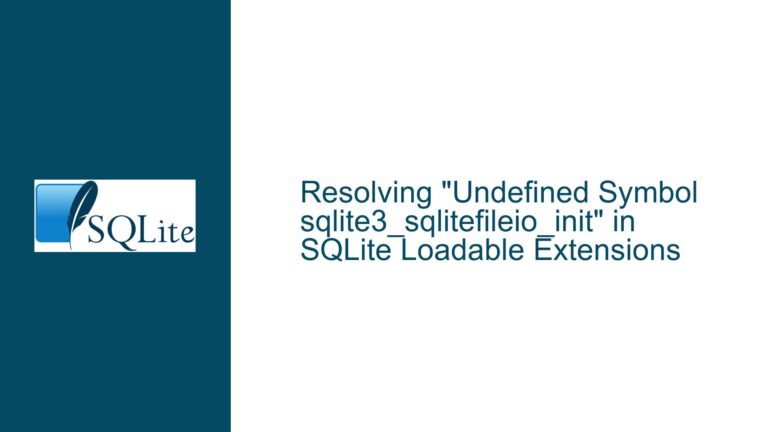Invalid UTF-8 BOM in SQLite Shell.c Causes Build Failure
Analysis of the UTF-8 BOM Artifact in SQLite Shell.c and Compilation Failures
1. Source Code Encoding Conflict: The Hidden BOM Character in SQLite’s Shell.c
The core issue revolves around an unexpected UTF-8 Byte Order Mark (BOM) embedded within the shell.c file of the SQLite amalgamation source code. The problematic line in question is:
static const char *zBomUtf8 = "\xef\xbb\xbf";
Here, the string literal includes an explicit BOM sequence (\xef\xbb\xbf) followed by an additional, unintended BOM character represented as (Unicode code point U+FEFF). This duplication creates a malformed UTF-8 sequence that certain compilers or build systems interpret as invalid syntax, leading to compilation errors.
Key Observations:
- The explicit BOM (
\xef\xbb\xbf) is intentionally included to handle UTF-8 encoding in the SQLite shell. - The trailing
is an invisible Unicode BOM character inadvertently added after the closing quote, likely due to text editor or IDE encoding mismatches during file modification. - Compilers like GCC, Clang, or MSVC may interpret the additional BOM as an invalid token, depending on their encoding settings, source file interpretation, or preprocessor behavior.
The error manifests during compilation as syntax-related warnings or errors, such as:
error: incomplete universal character name
error: stray '\xyz' in program
The conflict arises because the BOM is treated as part of the string literal, introducing an invalid byte sequence that disrupts the compiler’s parsing logic.
2. Root Causes of the BOM-Induced Compilation Failure
The issue stems from three interrelated factors:
A. Accidental Insertion of Redundant BOM Characters
The SQLite source code is maintained with strict adherence to ASCII-compatible UTF-8 encoding. However, the presence of the redundant after \xbf indicates that the file was temporarily saved or edited using a tool that forcibly inserts a BOM at the start or within the file. This is common in editors like Notepad (Windows) or IDEs configured to enforce BOMs for UTF-8 files. The result is a double BOM: one explicitly defined in the string literal and another unintentionally added by the editor.
B. Compiler-Specific Handling of UTF-8 BOMs in Source Files
While the C standard does not prohibit BOMs in source files, many compilers do not expect or support them:
- GCC and Clang typically ignore BOMs in UTF-8 files but may generate warnings if the BOM appears mid-file (outside the first few bytes).
- MSVC (Microsoft Visual C++) is more sensitive to BOM placement and may fail to parse source files if a BOM appears after the first line.
- Embedded BOMs in string literals are treated as literal data, which can trigger errors if the byte sequence forms invalid escape codes or non-printable characters.
C. Build System and Dependency Chain Sensitivities
The error was first observed in the Conan package manager during a build of the Poco libraries, which depend on SQLite. Conan’s build system may enforce strict compiler flags (e.g., -pedantic-errors in GCC) or use toolchains that reject non-standard source file encodings. This amplifies the impact of the redundant BOM, turning a minor inconsistency into a hard compilation failure.
3. Diagnosing, Resolving, and Preventing BOM-Related Build Failures
Step 1: Confirm the Presence of the Redundant BOM
Use a hex editor or command-line tool to inspect the offending line in shell.c:
hexdump -C shell.c | grep -A 2 "ef bb bf"
The output will show:
000066b0 20 20 73 74 61 74 69 63 20 63 6f 6e 73 74 20 63 | static const c|
000066c0 68 61 72 20 2a 7a 42 6f 6d 55 74 66 38 20 3d 20 |har *zBomUtf8 = |
000066d0 22 5c 78 65 66 5c 78 62 62 5c 78 62 66 ef bb bf |"\xef\xbb\xbf..|
000066e0 22 3b 0a 73 74 61 74 69 63 20 63 6f 6e 73 74 20 |";.static const |
Here, ef bb bf appears twice: once as the explicit \xef\xbb\xbf and again as the raw BOM bytes (ef bb bf) inserted after the closing quote.
Step 2: Remove the Redundant BOM Character
Edit shell.c to delete the invisible BOM:
- Open the file in a BOM-aware editor (e.g., VS Code, Sublime Text).
- Navigate to line 26338 and delete the character after
\xbf";. - Save the file with UTF-8 encoding without BOM.
Step 3: Update to the Patched SQLite Version
The SQLite team resolved this in a subsequent check-in. Replace the amalgamation source with the latest version:
wget https://sqlite.org/2024/sqlite-amalgamation-3450200.zip
unzip sqlite-amalgamation-3450200.zip
Step 4: Adjust Build System Configuration
If using Conan or another package manager:
- Override the SQLite dependency to use the patched version.
- Add a post-download patch step to remove the BOM:
# conanfile.py
def build(self):
tools.replace_in_file("shell.c", '"\\xef\\xbb\\xbf";', '"\\xef\\xbb\\xbf";')
Preventive Measures:
- Configure IDEs and text editors to never add BOMs to UTF-8 files.
- Add a pre-commit hook to detect BOMs:
# .git/hooks/pre-commit
if grep -rl $'\xEF\xBB\xBF' .; then
echo "Error: BOM detected in files!"
exit 1
fi
- Use compiler flags like
-Werror=invalid-utf8(if supported) to treat encoding issues as errors.
By addressing the root cause (redundant BOM), ensuring toolchain compatibility, and implementing preventive checks, developers can mitigate encoding-related build failures in SQLite and other dependency-driven projects.
